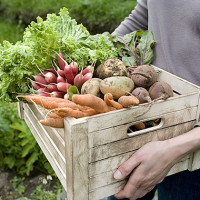A recent story in the San Francisco Chronicle’s “Home & Garden” section mentioned “garden coaches” as a natural progression from coaches who help us learn how to do everything, including how to run our lives, to coaching others on how to coach themselves.
The article gave the Jolly Green Goddess an “Aha!” moment. That’s one of the things I love: coaching people on how to gain happiness in and from their gardens, and on how to help their gardens bring them and others good cheer. Which is why I trim the roses at Sebastiani Vineyards & Winery, Vella Cheese, Mary Powers’ and our own gardens: to give other people pleasure, which, in turn, gives me great satisfaction and pleasure. Helping Sebastiani staff learn to trim roses so they produce more blooms spreads the beauty multi-fold, because they then use those new skills at home and, hopefully, pass them on to other home gardeners.
As the Jolly Green Goddess suggested two weeks ago, at this time of year we can either busy ourselves in the garden prepping it for winter and next year, worry about it, or forget about it and take a nap, which is an especially attractive alternative in the rain.
That’s the benefit of fall and winter. Plants and animals die, hibernate or go to sleep, in other words, take a nap. There’s a theme here.
Old timers and naturalists say that big acorns, which are lying around gardens even if you don’t have oak trees, thanks to local squirrels, mean a wet winter. And we appear to have both already.
What we do now in the garden, helping it to maximize its potential for next year, can greatly influence what it produces for us after we turn the page to a new calendar.
Turn off your sprinkling system. We don’t need to water as long as it’s raining every few days. Be sure to water potted plants that are under eves or overhangs. It’s even better to move them out into the rain if you can.
Do keep those healthy tree leaves around, either in a compost bin or pile. Compost ripens faster in a confined space, meaning container, box or bin. I took my holey plastic garbage can/compost bin to the dump because a healthy huge family of bad actor worms (not the good kind) had taken up residence and could munch their way through our entire garden if allowed.
• • • • • •
Now that we are well into October, some of our sorry-looking tomato plants appear so sad that we want to put them out of their misery and pull them up. Only do that when they have stopped producing, and don’t throw away the green ones.
I think the last two years we enjoyed our final tomatoes, ripened on the kitchen windowsill, for Christmas dinner. Some “experts” say to cover green tomatoes with crumpled newspaper and leave them in a dark closet, but you have to check them and remember where that eventual weird smell might be coming from.
• • • • • •
Some of your “annual” flowers and herbs can be teased into returning to productive life next spring if you nurture them now. It’s worth a try to cut back some of those annuals, water them occasionally if we don’t get much rain, and you will be surprised how many of them will come back. Even petunias and primulas (primroses) come back for me, and stocks and snapdragons (you can plant them soon) have returned in our garden for three or four years.
I don’t pull out any herbs, whether their labels say annual or perennial. Even if they look like goners, they may sprout new leaves as early as January and February, often near the base. I leave the brown stems and whatever else remains as a sort of protective cover, especially if they are under deciduous trees that have long lost their leaves.
“Good Bugs, Bad Bugs,” a fun and educational talk, will spew from the lips of Master Gardener Anne Lowings to help home gardeners identify beneficial insects in our gardens, as well as those that can cause serious harm. The free workshop is on Saturday, Oct. 20 at Sonoma Valley Library. Lowings’ personal special interests focus on cottage and herb gardens, but she will discuss how to control bugs without killing them and in the least toxic methods possible, including releasing lady beetles to get rid of their natural enemies, aphids. Lowings will also explain how to keep good and beneficial bugs in our garden and, hopefully, how to distinguish good from bad and how to eliminate bad while keeping good, all in environmentally friendly ways. 10:30 a.m.- noon, Saturday, Oct. 20. Free. 755 West Napa Street, Sonoma.
Get down. Get dirty!
We welcome your feedback. For general feedback or to contact one of our columnists, please visit the Columns page at www.sonomasun.com.






